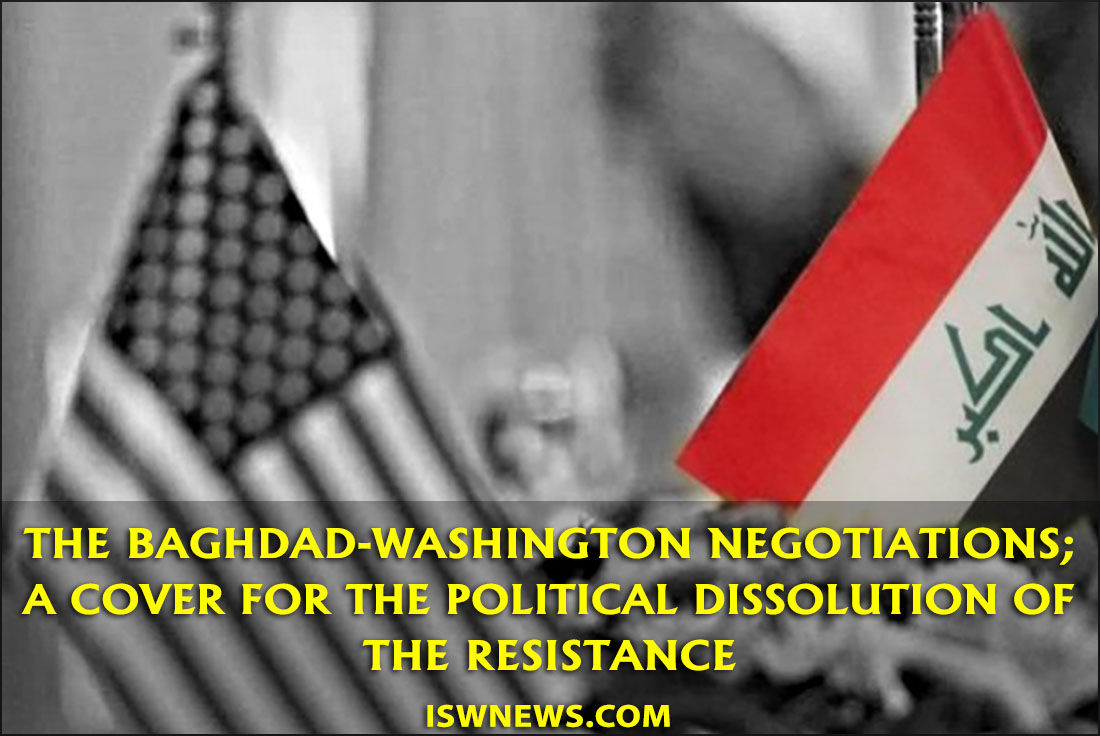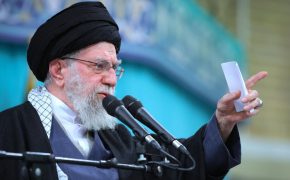The Baghdad-Washington negotiations; a cover for the political dissolution of the Resistance

Analyzing the dimensions of the Iraq-US negotiations has turned to one of the most controversial issues among the west Asian experts and strategic studies think tanks. The negotiations that were seriously pursued with al-Kadhimi coming to power; and we will see its continuation, considering the Mustafa al-Kadhimi interactive trait and the establishment of diplomatic relations.
Reviving the strategic relationships and expanding the cooperations
One of the issues that US officials have repeatedly used it for negotiating with Iraq, is the strategic relations. Due to the current economic crisis in Iraq and necessity of increasing the international cooperation for overcome this crisis, the US has announced its tendency for the reviving the economic cooperations in the goods exports and energy field to Iraq. It should be said that the price of Iraqi oil has been decreased, economic corruption is widespread in this country, and Corona has had also influenced on economic growth. So, all of these issues cause al-Kadhimi’s hands in negotiations with the US be closed. But negotiation doesn’t just end here.
Many Iraqi experts were considering the strategic negotiations between the US and Iraq only in security aspect and talking on the US troops withdrawal, but what actually happened was that the diplomatic appearance of these talks led to US political and anti-Resistance aims be followed in cover of strategic relationships. Few days before the negotiations, Matthew H. Tueller the US ambassador in Baghdad had said in an interview with Baghdad Today: the partnership and cooperation between the two countries are not limited to the security sector, and the US wants to hold this strategic talk in all of the mentioned areas with the aim of strengthening the cooperations, so that the various challenges that Iraq still faces with them, will be solved.
It seems that negotiations between Baghdad and Washington to be continued in the coming months, and it is clear that these negotiations will not reach a common point for exiting the Iraq from the crisis, but prolonging the negotiations is in the US favor, because when the Americans negotiate, they can delay their troops withdrawal from Iraq.
Another point that is important regarding to these negotiations, is that the US has started the plan of economic pressure on governments in which Resistance groups are present, so that these groups can be controlled and disarmed by the sovereignty of the country that they are in it; otherwise, sanctions and economic pressure will be imposed on all of the country, that we see its example in Lebanon.
Also in Iraq, due to the indirect confronting between the US and Resistance groups, this country wants to disarm the Hashd al-Shaabi and control it, by imposing diplomatic and economic pressure on government. The analysts and Western strategic studies centers are also want to by making reports, to show that the continuing the presence of Hashad al-Shaabi and the Iraqi armed Resistance forces is unnecessary, and to introduce them as the main cause of the unrest in Iraq, because of connection with Iran.
What is the Hashad al-Shaabi opinion about the Baghdad-Washington negotiations?
As mentioned at the beginning of the article, Iraqi Resistance groups are seriously seeking the expulsion of US troops from Iraq and have announced that the negotiations aim should be determining the timetable for withdrawal of US troops from Iraq.
Abu Ali al-Askari, security responsible at Iraqi Hezballah battalion wrote in his Twitter account about the points regarding to negotiation with Iraq: “we hoped that the political forces form a negotiating team with the American enemy, that their duty be only to determining the timetable for the withdrawal of aggressor troops from Iraq. But unfortunately, we were surprised by appointment of a group of people – as negotiators – that most of them are moving in the direction of US project n the country.”
Also, Hadi al-Ameri the Badr organization chief wrote in his Twitter account, with warning the Iraqi negotiating team: “Do not disappoint the hopes of the millions of Iraqis that were in the streets for withdrawal of foreign troops and achieving the national sovereignty. The martyrs are waiting you for good message about withdrawal of international coalition forces and determining time of their withdrawal of Iraq.”
Muhammad al-Ghaban the head of al-Fath coalition fraction in parliament also said in a statement that the Iraqi team should make its first priority in today talks with its US counterpart as what had been approved in parliament about expulsion of foreign troops from the country according to a time table.
However, a day after the first round of negotiations on Saturday, June 13, Morgan Ortagus the State Department spokeswoman announced that the US will remain as the largest provider of humanitarian aids to Iraq. She said, without determining the time of her country’s withdrawal from Iraq: The strategic talks between Baghdad and Washington was positive, and we will remain in Iraq until destruction of ISIS.
Due to the what seems about manner of these talks, the US still pursue the project of dismantle the Hashd al-Shaabi under the cover of its diplomatic relations with al-Kadhimi government, and maintains its bases in Iraq under the pretext of fighting with ISIS terrorism; that this is a kind of ignoring of Hashd al-Shaabi bravery in fighting with ISIS and reducing the importance of the Hasd al-Shaabi among Iraqi officials.
As it seems, the US demand in negotiation with Iraq is the long lasting presence of the US in Iraq with clear aims, and in addition to the economic view for presence in Iraq as a money market, the most important reason of it is controlling the Iraq foreign policy towards Iran and even entering in Iran’s national security sphere; so the Americans want to put pressure on the Islamic Republic of Iran, with their presence in Iraq.




Comment